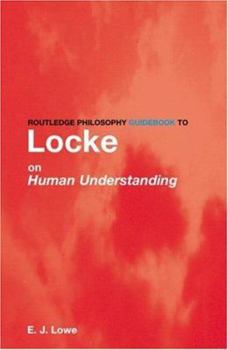Locke
Select Format
Select Condition 
Book Overview
John Locke is widely acknowledged as the most important figure in the history of English philosophy and An Essay Concerning Human Understanding is his greatest intellectual work, emphasising the... This description may be from another edition of this product.
Format:Paperback
Language:English
ISBN:0415100917
ISBN13:9780415100915
Release Date:May 1995
Publisher:Routledge
Length:216 Pages
Weight:0.53 lbs.
Dimensions:0.6" x 5.1" x 7.8"
Age Range:18 years and up
Grade Range:Postsecondary
Customer Reviews
1 rating
An excellent introduction to Locke -- and to Lowe
Published by Thriftbooks.com User , 25 years ago
John Locke was without a doubt one of the sanest and soberest souls ever to put pen to paper. Here philosopher Jonathan Lowe provides a fine and thorough introduction to Locke's greatest and most influential work: his _Essay Concerning Human Understanding_.Lowe not only provides clear and sound explications of Locke's own views, carefully placing them into historical context, but also inquires into whether Locke's views can be defended today -- and, perhaps surprisingly, finds that many of them are defensible though perhaps in need of modification. And Lowe does not hesitate to add his own views where necessary, by way of suggesting how a modern follower of Locke might carry his philosophy forward in light of scientific developments since Locke's day.The result is more than an introduction to Locke -- it is a scintillating volume that will be a pleasurable read even for longtime readers of Locke. Lowe has a knack for picking out the most interesting features of Locke's thought and presenting them in a new light.For example, I was quite struck by Lowe's remarks on Locke's "particularist" (Lowe's term) view of logic. Locke, as his readers may know, was extremely critical of syllogistic formalism, holding that while reasoned arguments may indeed be put in syllogistic form, it was nevertheless ridiculous to maintain that the use of the form itself is what gives validity to an argument. As Locke famously remarked, God was not so sparing as to make men barely two-legged and leave it to Aristotle to make them rational.Lowe trenchantly notes that Locke's critiques would apply equally well to the Frege-Russell variety of formal logic; Locke, very much like Brand Blanshard in _Reason and Analysis_, held that we reason by connecting terms through their _meanings_, which a strictly formal logic provides no way to do.Lowe's remarks on this point are food for thought not only on the matter of formal logic but on the question of what allegedly divides "rationalism" from "empiricism." Elsewhere in this volume, Lowe suggests that the firm distinction between these allegedly opposite schools of thought cannot be made out; and Locke was quite clearly a rationalist as regards knowledge even if he believed we arrived at all of our our ideas "empirically." That is, Locke clearly still has something to say to the rationalist philosophers of our own day -- and through Lowe, he says it.And says it well: it is very much to Lowe's credit that, through his own lucid prose, he has allowed Locke to speak so clearly. The reader of this excellent introduction will find Locke to be fine intellectual company -- and also Lowe, a clear thinker and graceful writer whose own admiration for Locke is never explicitly stated but is nevertheless obvious through the keen sympathy of his presentation.All in all, then, a delightful volume very much in the Lockean spirit.





